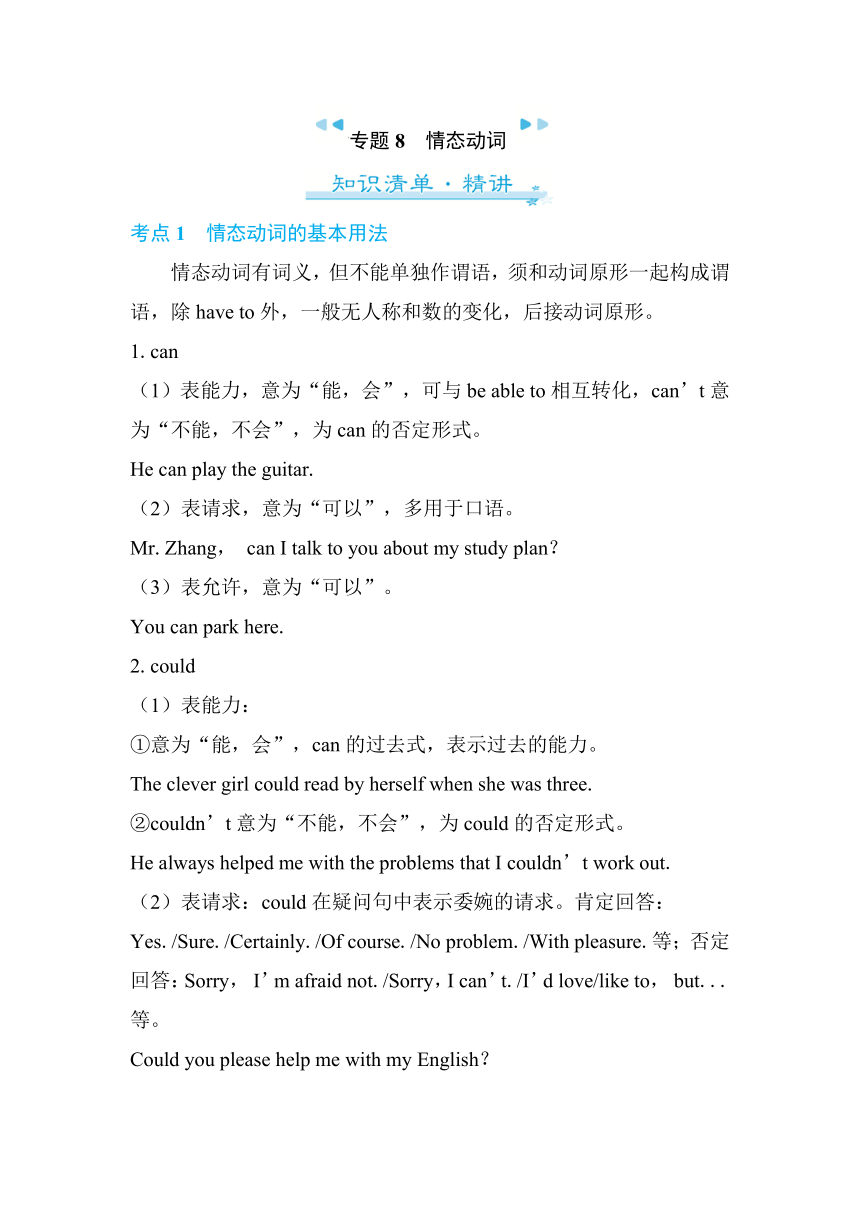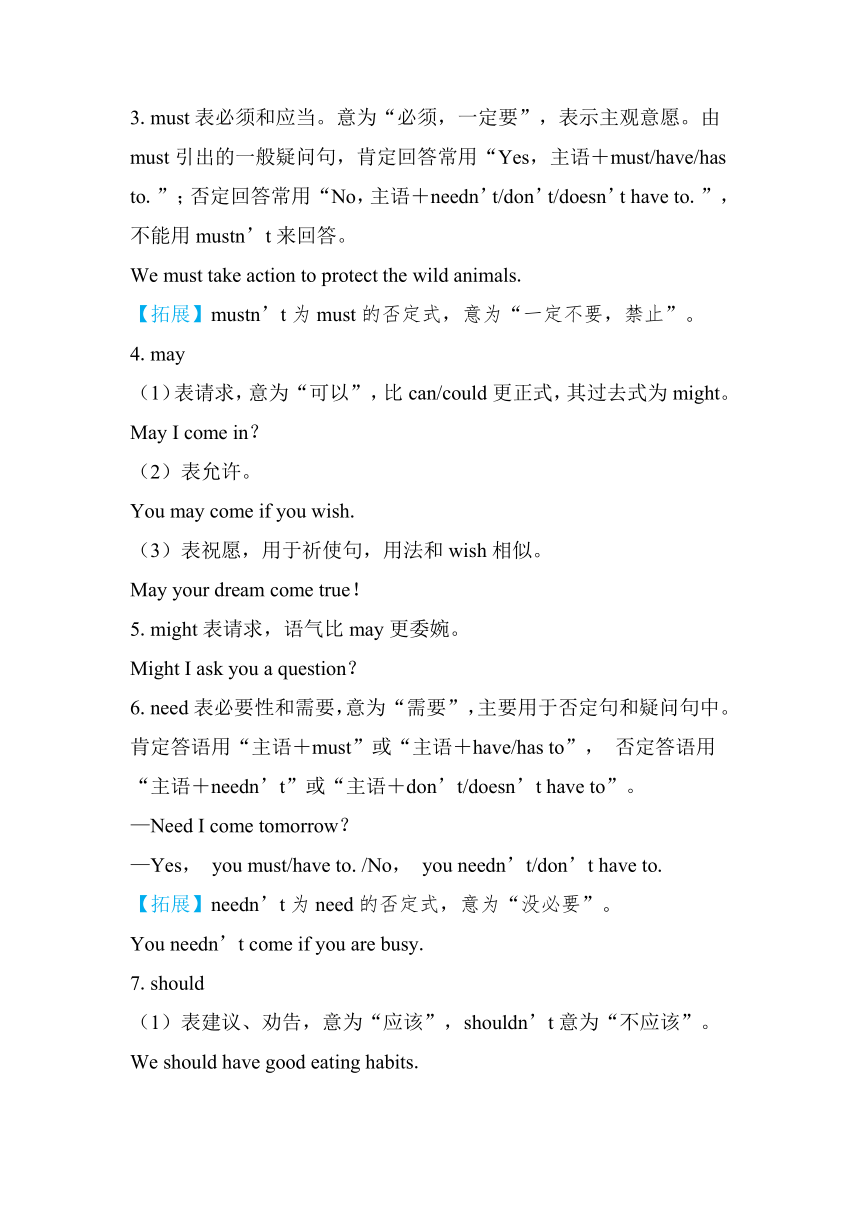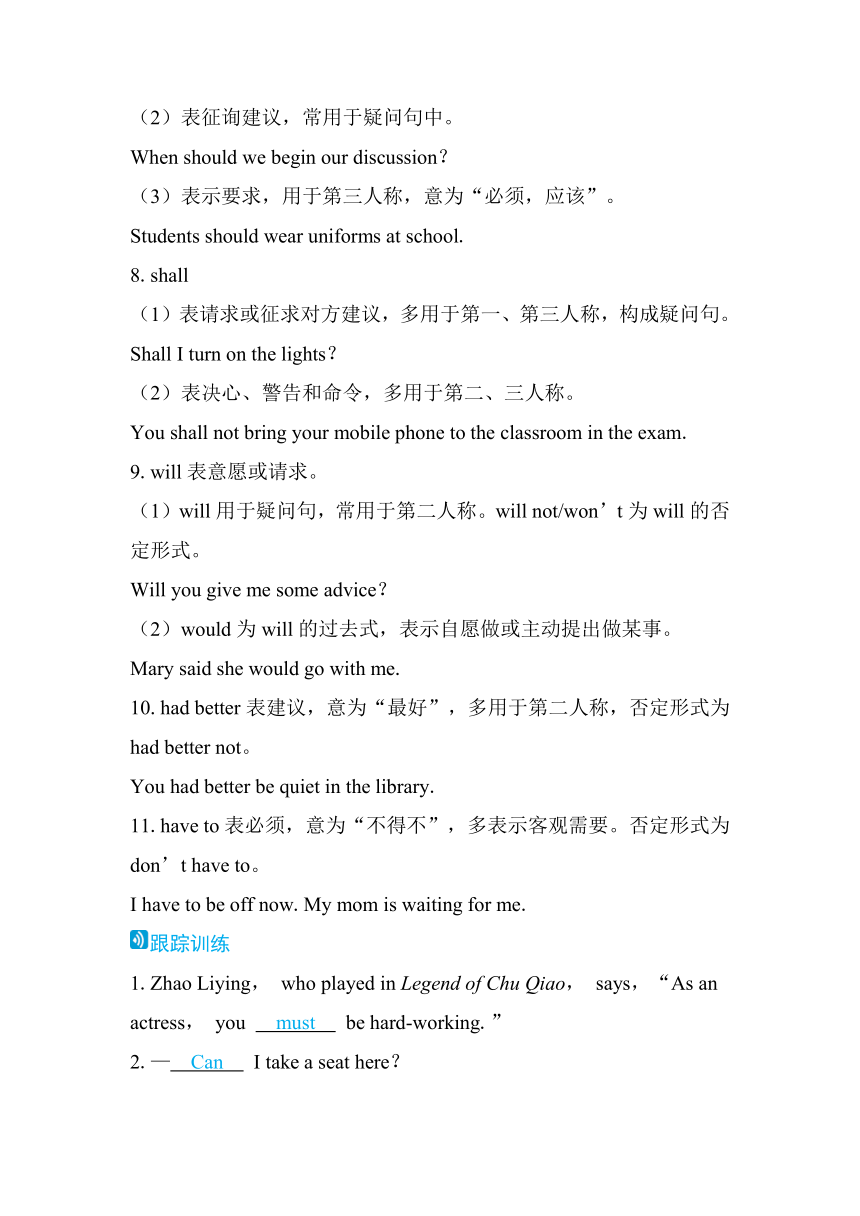专题8 情态动词语法专项中考二轮复习突破讲义(含答案)2024-2025学年人教新目标(Go for it)版英语九年级上册
文档属性
| 名称 | 专题8 情态动词语法专项中考二轮复习突破讲义(含答案)2024-2025学年人教新目标(Go for it)版英语九年级上册 |

|
|
| 格式 | docx | ||
| 文件大小 | 119.6KB | ||
| 资源类型 | 教案 | ||
| 版本资源 | 人教新目标(Go for it)版 | ||
| 科目 | 英语 | ||
| 更新时间 | 2024-12-10 22:52:19 | ||
图片预览



文档简介
专题8 情态动词
考点1 情态动词的基本用法
情态动词有词义,但不能单独作谓语,须和动词原形一起构成谓语,除have to外,一般无人称和数的变化,后接动词原形。
1.can
(1)表能力,意为“能,会”,可与be able to相互转化,can’t意为“不能,不会”,为can的否定形式。
He can play the guitar.
(2)表请求,意为“可以”,多用于口语。
Mr.Zhang, can I talk to you about my study plan?
(3)表允许,意为“可以”。
You can park here.
2.could
(1)表能力:
①意为“能,会”,can的过去式,表示过去的能力。
The clever girl could read by herself when she was three.
②couldn’t意为“不能,不会”,为could的否定形式。
He always helped me with the problems that I couldn’t work out.
(2)表请求:could在疑问句中表示委婉的请求。肯定回答:Yes./Sure./Certainly./Of course./No problem./With pleasure.等;否定回答:Sorry, I’m afraid not./Sorry,I can’t./I’d love/like to, but...等。
Could you please help me with my English?
3.must表必须和应当。意为“必须,一定要”,表示主观意愿。由must引出的一般疑问句,肯定回答常用“Yes,主语+must/have/has to.”;否定回答常用“No,主语+needn’t/don’t/doesn’t have to.”,不能用mustn’t来回答。
We must take action to protect the wild animals.
【拓展】mustn’t为must的否定式,意为“一定不要,禁止”。
4.may
(1)表请求,意为“可以”,比can/could更正式,其过去式为might。
May I come in?
(2)表允许。
You may come if you wish.
(3)表祝愿,用于祈使句,用法和wish相似。
May your dream come true!
5.might表请求,语气比may更委婉。
Might I ask you a question?
6.need表必要性和需要,意为“需要”,主要用于否定句和疑问句中。肯定答语用“主语+must”或“主语+have/has to”, 否定答语用“主语+needn’t”或“主语+don’t/doesn’t have to”。
—Need I come tomorrow?
—Yes, you must/have to./No, you needn’t/don’t have to.
【拓展】needn’t为need的否定式,意为“没必要”。
You needn’t come if you are busy.
7.should
(1)表建议、劝告,意为“应该”,shouldn’t意为“不应该”。
We should have good eating habits.
(2)表征询建议,常用于疑问句中。
When should we begin our discussion?
(3)表示要求,用于第三人称,意为“必须,应该”。
Students should wear uniforms at school.
8.shall
(1)表请求或征求对方建议,多用于第一、第三人称,构成疑问句。
Shall I turn on the lights?
(2)表决心、警告和命令,多用于第二、三人称。
You shall not bring your mobile phone to the classroom in the exam.
9.will表意愿或请求。
(1)will用于疑问句,常用于第二人称。will not/won’t为will的否定形式。
Will you give me some advice?
(2)would为will的过去式,表示自愿做或主动提出做某事。
Mary said she would go with me.
10.had better表建议,意为“最好”,多用于第二人称,否定形式为had better not。
You had better be quiet in the library.
11.have to表必须,意为“不得不”,多表示客观需要。否定形式为don’t have to。
I have to be off now.My mom is waiting for me.
跟踪训练
1.Zhao Liying, who played in Legend of Chu Qiao, says,“As an actress, you must be hard-working.”
2.— Can I take a seat here?
—No, you can’t. It’s only for the old and children.
3.After our school’s farming activities, we realized that everyone should save food.
4.—What kind of person do you want to make friends with?
—Well, he needn’t be clever, but he must be honest.
考点2 情态动词表推测
词汇 含义及用法
must 表示非常有把握的肯定推测,意为“一定,肯定”(100%的可能性)。 She must be tired after a very long journey.
could 表推测,意为“有可能,也许”(20%~80%的可能性),语气缓和,较委婉。 They could forget to invite you.
may 表推测,意为“有可能,也许”,用于肯定句,表示把握不大的推测。 He may know the answer.
might 表推测,意为“有可能,也许”,可能性比may小,语气缓和,较委婉。 He might be right.
can can’t为can的否定式,表示否定推测,语气强烈,意为“一定不,不可能”,可能性几乎为零。 That can’t be Jane. I saw her in the library just now.
【总结】表肯定推测:must(100%)>could/may(20%~80%)>might
表否定推测:can’t>may not>might not
跟踪训练
5.—Excuse me, how can I get to the nearest hospital?
—Go straight and walk into Renmin Road. You can’t miss it. It’s opposite the bank.
6.—Look! People outside are wearing thick coats.
—The weather must be very cold.
7.I think Henry may/might be late for the concert, because the traffic is so terrible now.
用括号内所给单词的适当形式填空或盲填。
1.The result of this English exam must be (is) great because everyone did a good job these days.
2.—Is it important to protect wild animals, Susan?
—Yes. If we don’t protect them, they may die (dying) out one day.
3.Words could not express (express) her feelings at that moment.
4.According to the new regulation(规定), school students mustn’t take (took) their cell phones to the classroom.
5.Parents shouldn’t push their kids so hard;they should understand (understand) their children.
6.We should try (tried) our best to fight against pollution.
7.—Hi, Carl! I’m leaving for Chengdu this weekend.
—Cool! But I can’t get (getting) away until the end of July.
8.Mother had a hard time getting Helen up in the morning. She called and called, but Helen wouldn’t wake (woke) up.
9.—China is going to use AI to protect the Great Wall.
—Great! AI is so helpful that people can use it in their daily life now.(盲填)
10.You mustn’t eat here! Look at the sign. It reads “No eating.”(盲填)
11.Sam had gone to skate with his friends. No wonder I couldn’t find him in the classroom.(盲填)
12.—Someone is singing in the music classroom. Is that Mr. Smith?
—That can’t be him. He has gone to Beijing for a meeting. (盲填)
13.You shouldn’t spend all your free time on your phone or computer.(盲填)
14.Nowadays all passengers must go through safety check before they take a train. (盲填)
考点1 情态动词的基本用法
情态动词有词义,但不能单独作谓语,须和动词原形一起构成谓语,除have to外,一般无人称和数的变化,后接动词原形。
1.can
(1)表能力,意为“能,会”,可与be able to相互转化,can’t意为“不能,不会”,为can的否定形式。
He can play the guitar.
(2)表请求,意为“可以”,多用于口语。
Mr.Zhang, can I talk to you about my study plan?
(3)表允许,意为“可以”。
You can park here.
2.could
(1)表能力:
①意为“能,会”,can的过去式,表示过去的能力。
The clever girl could read by herself when she was three.
②couldn’t意为“不能,不会”,为could的否定形式。
He always helped me with the problems that I couldn’t work out.
(2)表请求:could在疑问句中表示委婉的请求。肯定回答:Yes./Sure./Certainly./Of course./No problem./With pleasure.等;否定回答:Sorry, I’m afraid not./Sorry,I can’t./I’d love/like to, but...等。
Could you please help me with my English?
3.must表必须和应当。意为“必须,一定要”,表示主观意愿。由must引出的一般疑问句,肯定回答常用“Yes,主语+must/have/has to.”;否定回答常用“No,主语+needn’t/don’t/doesn’t have to.”,不能用mustn’t来回答。
We must take action to protect the wild animals.
【拓展】mustn’t为must的否定式,意为“一定不要,禁止”。
4.may
(1)表请求,意为“可以”,比can/could更正式,其过去式为might。
May I come in?
(2)表允许。
You may come if you wish.
(3)表祝愿,用于祈使句,用法和wish相似。
May your dream come true!
5.might表请求,语气比may更委婉。
Might I ask you a question?
6.need表必要性和需要,意为“需要”,主要用于否定句和疑问句中。肯定答语用“主语+must”或“主语+have/has to”, 否定答语用“主语+needn’t”或“主语+don’t/doesn’t have to”。
—Need I come tomorrow?
—Yes, you must/have to./No, you needn’t/don’t have to.
【拓展】needn’t为need的否定式,意为“没必要”。
You needn’t come if you are busy.
7.should
(1)表建议、劝告,意为“应该”,shouldn’t意为“不应该”。
We should have good eating habits.
(2)表征询建议,常用于疑问句中。
When should we begin our discussion?
(3)表示要求,用于第三人称,意为“必须,应该”。
Students should wear uniforms at school.
8.shall
(1)表请求或征求对方建议,多用于第一、第三人称,构成疑问句。
Shall I turn on the lights?
(2)表决心、警告和命令,多用于第二、三人称。
You shall not bring your mobile phone to the classroom in the exam.
9.will表意愿或请求。
(1)will用于疑问句,常用于第二人称。will not/won’t为will的否定形式。
Will you give me some advice?
(2)would为will的过去式,表示自愿做或主动提出做某事。
Mary said she would go with me.
10.had better表建议,意为“最好”,多用于第二人称,否定形式为had better not。
You had better be quiet in the library.
11.have to表必须,意为“不得不”,多表示客观需要。否定形式为don’t have to。
I have to be off now.My mom is waiting for me.
跟踪训练
1.Zhao Liying, who played in Legend of Chu Qiao, says,“As an actress, you must be hard-working.”
2.— Can I take a seat here?
—No, you can’t. It’s only for the old and children.
3.After our school’s farming activities, we realized that everyone should save food.
4.—What kind of person do you want to make friends with?
—Well, he needn’t be clever, but he must be honest.
考点2 情态动词表推测
词汇 含义及用法
must 表示非常有把握的肯定推测,意为“一定,肯定”(100%的可能性)。 She must be tired after a very long journey.
could 表推测,意为“有可能,也许”(20%~80%的可能性),语气缓和,较委婉。 They could forget to invite you.
may 表推测,意为“有可能,也许”,用于肯定句,表示把握不大的推测。 He may know the answer.
might 表推测,意为“有可能,也许”,可能性比may小,语气缓和,较委婉。 He might be right.
can can’t为can的否定式,表示否定推测,语气强烈,意为“一定不,不可能”,可能性几乎为零。 That can’t be Jane. I saw her in the library just now.
【总结】表肯定推测:must(100%)>could/may(20%~80%)>might
表否定推测:can’t>may not>might not
跟踪训练
5.—Excuse me, how can I get to the nearest hospital?
—Go straight and walk into Renmin Road. You can’t miss it. It’s opposite the bank.
6.—Look! People outside are wearing thick coats.
—The weather must be very cold.
7.I think Henry may/might be late for the concert, because the traffic is so terrible now.
用括号内所给单词的适当形式填空或盲填。
1.The result of this English exam must be (is) great because everyone did a good job these days.
2.—Is it important to protect wild animals, Susan?
—Yes. If we don’t protect them, they may die (dying) out one day.
3.Words could not express (express) her feelings at that moment.
4.According to the new regulation(规定), school students mustn’t take (took) their cell phones to the classroom.
5.Parents shouldn’t push their kids so hard;they should understand (understand) their children.
6.We should try (tried) our best to fight against pollution.
7.—Hi, Carl! I’m leaving for Chengdu this weekend.
—Cool! But I can’t get (getting) away until the end of July.
8.Mother had a hard time getting Helen up in the morning. She called and called, but Helen wouldn’t wake (woke) up.
9.—China is going to use AI to protect the Great Wall.
—Great! AI is so helpful that people can use it in their daily life now.(盲填)
10.You mustn’t eat here! Look at the sign. It reads “No eating.”(盲填)
11.Sam had gone to skate with his friends. No wonder I couldn’t find him in the classroom.(盲填)
12.—Someone is singing in the music classroom. Is that Mr. Smith?
—That can’t be him. He has gone to Beijing for a meeting. (盲填)
13.You shouldn’t spend all your free time on your phone or computer.(盲填)
14.Nowadays all passengers must go through safety check before they take a train. (盲填)
同课章节目录
